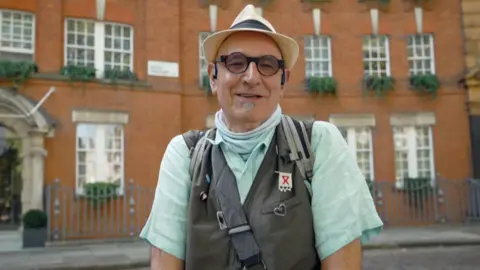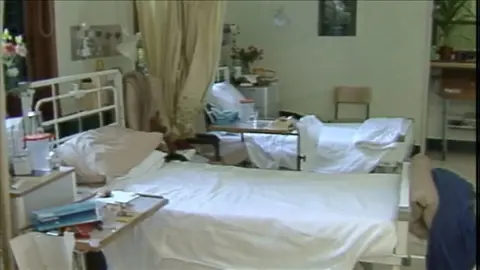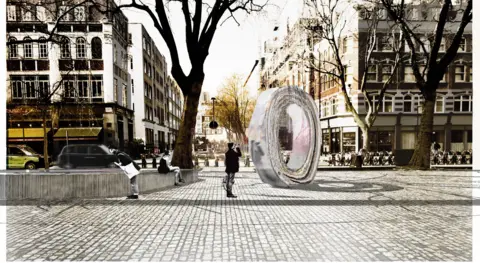'I was told I had between three and nine months to live'
 BBC
BBC"I was told I had a virus with no cure and between three and nine months to live."
HIV activist Jonathan Blake believes he was one of, if not the first person to be diagnosed in Britain with human immunodeficiency virus, known as HIV, when he was aged 33.
"I was diagnosed in October 1982 at the Middlesex Hospital. It was incredibly winding."
He was diagnosed so early in the UK Aids epidemic that he was named Patient L1 at the hospital, and his story was featured in the 2014 film Pride.
Recalling the early days of diagnosis, he told BBC London "every single lymph node in my body had just erupted".
After undergoing tests in hospital, he was kept in a side ward for two days.
Jonathan, who is now 76, said he was told by doctors he would be given "palliative care when the time comes" - to which he thought: "I'm 33, do I really want to hear about palliative care?"
He added: "I have been living with this virus and literally just trying to live every day. Never thinking that I will have a life, it's always been there."
'Forgotten epidemic'
HIV is a virus that damages the cells in your immune system and weakens your ability to fight everyday infections and disease.
Aids (acquired immune deficiency syndrome) is when a number of potentially life-threatening infections and illnesses happen when the immune system has been severely damaged by the HIV virus.
While Aids cannot be transmitted from one person to another, the HIV virus can.
"It really wasn't until 2015, when they first announced 'U = U', 'Undetectable = Untransmittable', that I was no longer this kind of leper - that I had this poisoned blood, that I could infect anybody," Jonathan said.
The term means that if someone has an undetectable viral load, they cannot sexually transmit HIV to others.
The Terrence Higgins Trust charity reports that by 1999, 33m people were living with HIV worldwide while the World Health Report listed Aids as the fourth biggest killer worldwide, 20 years after the epidemic began.
According to the National Aids Trust, 2023 was the highest year for people receiving HIV care with 107,949 treated - an increase of 27% across the last 10 years.
Jonathan said: "HIV is this forgotten epidemic. It is never talked about and it's so important it is.
"A lot of that is to do with stigma."
He added: "I was on effective medication, because we have an amazing NHS. I am so fortunate that I have had access to the medication.
"The most important thing to do is know your status, be brave, get tested.
"The developments that are happening are extraordinary - even though there is no cure," he continued.
"I'm living proof."

Jonathan attended the launch on Wednesday of the report Getting to zero by 2030: HIV in London at the site of the future HIV/Aids Memorial which is planned to be placed in Fitzrovia.
In 2018, the London mayor, London Councils, Public Health England and NHS England signed up to the Fast-Track Cities Declaration to reach zero new HIV infections, zero HIV-related stigma and zero HIV-related deaths by 2030.
The report, by the London Assembly Health Committee, found that despite progress in attitudes towards HIV, HIV-related stigma remained prevalent in London and the UK.
London has historically had, and continues to have, higher rates of HIV than the rest of the country.
However, the London Assembly said the city was leading the way globally to end new HIV cases and was seen as a leading international example through its HIV prevention and treatment programmes.
The Assembly added that "concerted action" would be required to increase testing, improve access to Pre-Exposure Prophylaxis (PrEP), ensure that everyone with HIV could access the care they needed and that services must reach people and communities who were currently missing out on them.
Recommendations in the report included:
- Giving greater prominence to the issue of HIV, with a focus on what key actions were needed to help London reach its 2030 goal
- The mayor should promote the HIV Confident charter in London and advocate for more organisations to sign up to it in 2025, including the councils, healthcare settings and businesses
- The mayor should help ensure that construction of the HIV/Aids memorial in London was completed by the end of 2027 and use it as an opportunity to work with others to promote anti-stigmatising initiatives and public health messaging in relation HIV
Increase in cases
Chair of the London Assembly Health Committee, Krupesh Hirani, said London was "a long way off" reaching its 2030 target.
"After many years in which there was a year-on-year decline in new HIV cases, there has been an increase in cases in London and England since 2020. We would like to see the mayor take further action," he said.
A spokesperson for the mayor said Sadiq Khan would respond to the Assembly's report in due course.
They added: "The current government has committed to commissioning a new HIV action plan and the mayor looks forward to working closely with ministers to help end HIV cases by 2030, as we build a fairer and healthier London for everyone."
 Anya Gallaccio and Rinehart Herbst
Anya Gallaccio and Rinehart HerbstIn December 2023, the mayor announced £130,000 of funding from the Commission for Diversity in the Public Realm towards the construction of a permanent HIV and Aids memorial in London.
Aids Memory UK, which is behind the project, said the memorial would be unveiled at the end of 2027 and the artwork would take the form of a felled tree.
Ambassador of Aids Memorial UK, Mzz Kimberley, also known as Kim Tatum, said: "The memorial is going to be a place where people can go and reflect, educate themselves, feel peace, talk to people.
"This memorial will mean that everyone who lost their life had meaning.
"It's a dedication to all the people around the world who've lost their life, or the injustices that society has brought to them."
The memorial means a lot to Jonathan, saying it would help "create a community - I am so proud to be part of this HIV community.
"I've lost lots of friends - some very, very early but some more recently, and it still hurts."
Listen to the best of BBC Radio London on Sounds and follow BBC London on Facebook, X and Instagram. Send your story ideas to [email protected]
